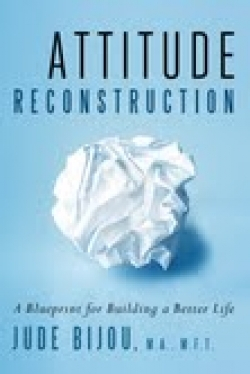
Attitude Reconstruction
A Blueprint for Building a Better Life
Everyone yearns for more love and peace within themselves and in their families, but too often, people get stuck in a dreary cycle of isolation, fear, anger, and sadness. Despite wanting emotional health, individuals can fashion their emotions into weapons that hurt themselves, others, and their chances for a harmonious life, believes first-time author Jude Bijou.
“Dealing with our emotions constructively is the key to living a better life,” she writes. “I am continually astonished, however, at how much we resist doing so, even when we know how much good it will do.”
A marriage and family therapist, as well as a longtime student of Eastern philosophy, Bijou developed her theory of attitude reconstruction while working with clients to help them lead more fulfilling lives. She theorizes that every feeling derives from six primary emotions—sadness, anger, fear, joy, love, and peace—much like every shade in the rainbow can be made from the three primary colors.
Bijou believes that joy, love, and peace are fundamental aspects of our spiritual nature, but that all emotions spring from the human condition. When people allow sadness, anger, and fear to reign free, it corrupts their bodies, behaviors, minds, and overall sense of well-being. Stress runs rampant, and unreleased emotions can fuel addictions and violence.
With her “attitude reconstruction,” individuals are encouraged to express emotions physically and constructively, and replace habitual negative thinking with what’s true. Much like exercise will gradually get someone into shape, attitude reconstruction tactics will “tone the emotional body,” notes Bijou. By understanding how emotions work, and recognizing the potentially harmful effects of feelings like fear, people can clarify priorities, create more intimacy within relationships, tackle indecision, and handle others’ anger.
Bijou’s guidebook is comprehensive in scope, bringing together real-life examples of emotions gone awry, as well as the author’s experiences in helping clients. She includes possible goals for overcoming sadness, anger, and fear, and strategies on how to achieve those aims.
Particularly useful is a chapter on battling old habits, and she defines addictive behaviors as “any substance or activity that masks our emotions and provides an immediate but temporary dose of pleasure.” Alcohol and nicotine are included, but so is seeking approval, hypochondria, too many hours of television, or excessive exercise. Recognizing destructive behavior can lead to realizations about the underpinnings of emotion that drive those actions.
Bijou’s blueprint for finding joy, love, and peace is as solid as any architectural rendering, and her straightforward, supportive strategies can help anyone build their emotional dream home.
Reviewed by
Elizabeth Millard
Disclosure: This article is not an endorsement, but a review. The publisher of this book provided free copies of the book and paid a small fee to have their book reviewed by a professional reviewer. Foreword Reviews and Clarion Reviews make no guarantee that the publisher will receive a positive review. Foreword Magazine, Inc. is disclosing this in accordance with the Federal Trade Commission’s 16 CFR, Part 255.
